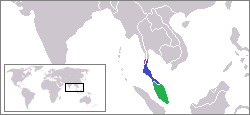Description
Vegetative characteristics
Barclaya panchorensis is an aquatic plant with stoloniferous, 2–4 cm long, and 0.5 cm wide rhizomes. The slender stolons are up to 40 cm long. The coriaceous, green, petiolate, cordate to circular leaves are 3–5 cm wide. The pubescent or glabrous, green petioles are 5–10 cm long. [2]
Generative characteristics
The nocturnal, 5 cm wide flowers are attached to pubescent to glabrous, 10–15 cm long peduncles. The flowers have staminodes, and 20-30 anthers. The gynoecium consists of 8-10 carpels. The globose,1 cm wide fruit bears ellipsoid, echinate, 1 mm long, and 0.5 mm wide seeds. [2]
Cytology
The diploid chromosome count is 2n= 36. [2]
This page is based on this
Wikipedia article Text is available under the
CC BY-SA 4.0 license; additional terms may apply.
Images, videos and audio are available under their respective licenses.
